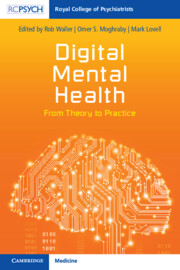Book contents
- Digital Mental Health
- Digital Mental Health
- Copyright page
- Contents
- Contributors
- Introduction
- Chapter 1 Working with IT Systems
- Chapter 2 Technology-Enabled Care
- Chapter 3 Note Keeping in the Digital Age
- Chapter 4 Big Data
- Chapter 5 Artificial Intelligence
- Chapter 6 Digital Clinicians
- Chapter 7 Global Telepsychiatry
- Chapter 8 The Integration Agenda
- Chapter 9 Digital Wellbeing
- Chapter 10 Conclusion
- Appendix: Abbreviations
- Index
- References
Chapter 10 - Conclusion
The Future of Mental Health
Published online by Cambridge University Press: 23 November 2023
- Digital Mental Health
- Digital Mental Health
- Copyright page
- Contents
- Contributors
- Introduction
- Chapter 1 Working with IT Systems
- Chapter 2 Technology-Enabled Care
- Chapter 3 Note Keeping in the Digital Age
- Chapter 4 Big Data
- Chapter 5 Artificial Intelligence
- Chapter 6 Digital Clinicians
- Chapter 7 Global Telepsychiatry
- Chapter 8 The Integration Agenda
- Chapter 9 Digital Wellbeing
- Chapter 10 Conclusion
- Appendix: Abbreviations
- Index
- References
Summary
The quote above is there because it encompasses many aspects of what it means to be a digital mental health service but, sadly, also some of the reasons why progress thus far has been patchy.* Many digital initiatives have an initial fizz of activity but then fizzle out as the focus inevitably moves to something else. The NHS and most healthcare systems are complex systems with feedback loops and built-in compensatory measures. These come into play to restore the status quo and slow down change. They are designed to be safe – but sometimes work too well.
Instead, Matthew Taylor advocates that to bring in lasting change we need to think like a system – which here means digitising all parts of the NHS, placing digital transformation as core to the business of delivering healthcare and having the right incentives built in.
- Type
- Chapter
- Information
- Digital Mental HealthFrom Theory to Practice, pp. 122 - 127Publisher: Cambridge University PressPrint publication year: 2023

